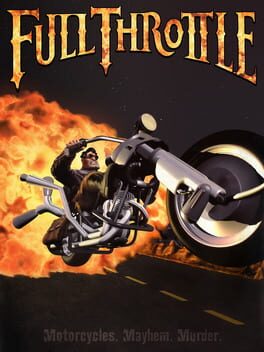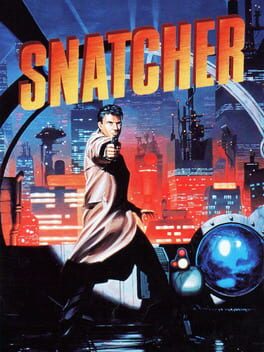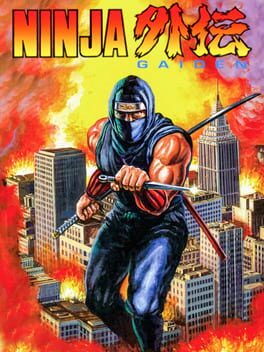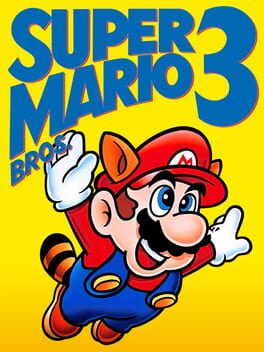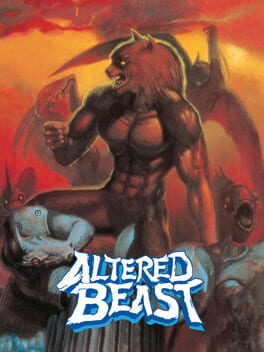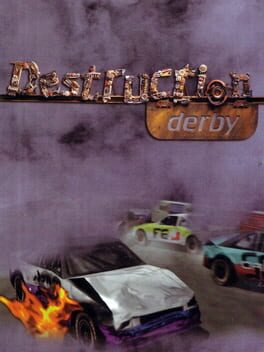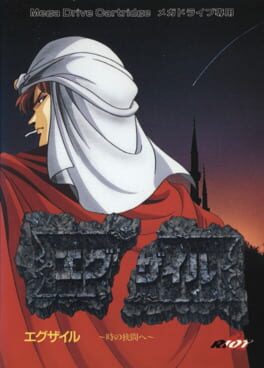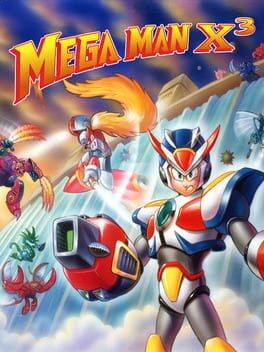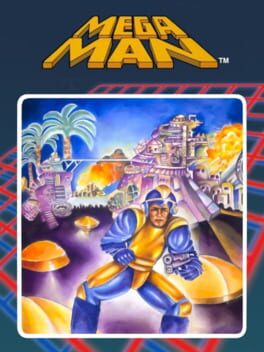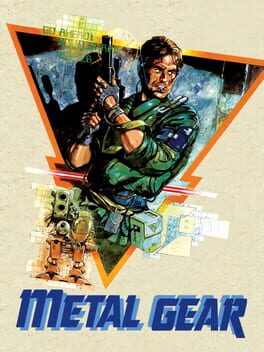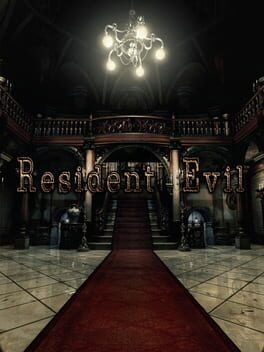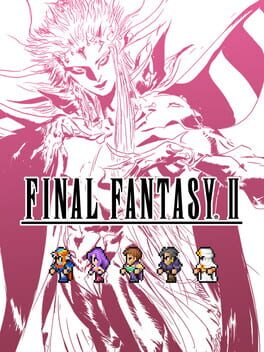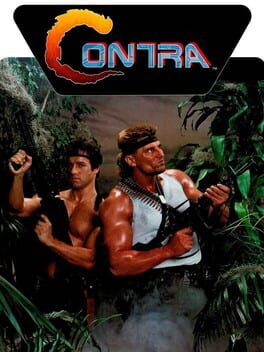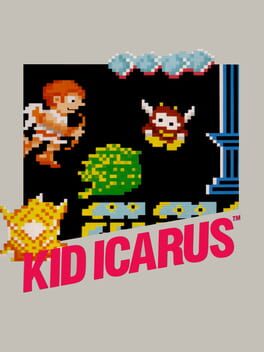TheMaxine
1995
During this period of time, I'm starting to see Tim Schafer as one of the many ambitious names that wanted to bring a more cinematic quality to the gaming medium. Point 'n clicks don't just have to be wacky and funny, they can tell a more proper story, something akin to a movie. I think it's here where Tim was really starting to push the company he was working under to prioritize these sorts of titles.
With that said, I can't really lie, this one's doing absolutely nothing for me. Maybe my disinterest in Mad Max-like settings was already the first sign that I should've stayed away, but even with the prospect of getting to watch some cool bike battles, and enjoy the aesthetic of those old 90's PC games, I've found the execution of everything here so drab, sluggish, and confusing (in the spirit of point 'n clicks of that time), that I don't think this would've hit even if I was a Mad Max fan.
The biggest complaint I can voice is the one that I've already done so in the past, which would be the LucasArts voice direction curse. In the case of Maniac Mansion, the problem with the voice direction there, was that it didn't match the crazed cartoony visuals. In the case of Full Throttle, the voice direction doesn't match the all-star cast. LucasArts must have presumably spent a ton of money to hire people like Mark Hamill, or Kath Soucie. Yet they pretty much never get an opportunity here to really flex their acting chops. No shouting, no major emotional range, so why bother hiring them at all?
The only reason I can think of is because star power makes your game look more appealing to purchase. But if I saw a poster for a big blockbuster movie with a cast of people I'm crazy for, and found out they all sound like they just got out of bed, I dunno, I'd be feeling a little bit ripped off, or in the very least, like an opportunity was squandered. LucasArts brought a bunch of big names to this video game, that's fine, but what do the big names bring to it?
As for everything else, I wanna say that there's some creative things in here, and I mean, you've got a couple hours, a guide if you're stuck, and you can clear this game, easy. It's short enough that you wouldn't really be able to waste your life playing it anyway, and it's always possible that you'll like it way more than what my shoddy little review here is saying. But for me, voice acting and voice delivery is everything in this sort of point 'n click. If it's not doing enough, then the rest of my engagement in every other aspect of the game falls apart. My engagement to solve the next obtuse puzzle, or deal with that really repetitive bike combat minigame, has to be reinforced by rewarding me with the next big joke, or the next big overall moment. And it's trying, it's definitely trying to hit me with these things, but the energy and the punch just isn't there.
With that said, I can't really lie, this one's doing absolutely nothing for me. Maybe my disinterest in Mad Max-like settings was already the first sign that I should've stayed away, but even with the prospect of getting to watch some cool bike battles, and enjoy the aesthetic of those old 90's PC games, I've found the execution of everything here so drab, sluggish, and confusing (in the spirit of point 'n clicks of that time), that I don't think this would've hit even if I was a Mad Max fan.
The biggest complaint I can voice is the one that I've already done so in the past, which would be the LucasArts voice direction curse. In the case of Maniac Mansion, the problem with the voice direction there, was that it didn't match the crazed cartoony visuals. In the case of Full Throttle, the voice direction doesn't match the all-star cast. LucasArts must have presumably spent a ton of money to hire people like Mark Hamill, or Kath Soucie. Yet they pretty much never get an opportunity here to really flex their acting chops. No shouting, no major emotional range, so why bother hiring them at all?
The only reason I can think of is because star power makes your game look more appealing to purchase. But if I saw a poster for a big blockbuster movie with a cast of people I'm crazy for, and found out they all sound like they just got out of bed, I dunno, I'd be feeling a little bit ripped off, or in the very least, like an opportunity was squandered. LucasArts brought a bunch of big names to this video game, that's fine, but what do the big names bring to it?
As for everything else, I wanna say that there's some creative things in here, and I mean, you've got a couple hours, a guide if you're stuck, and you can clear this game, easy. It's short enough that you wouldn't really be able to waste your life playing it anyway, and it's always possible that you'll like it way more than what my shoddy little review here is saying. But for me, voice acting and voice delivery is everything in this sort of point 'n click. If it's not doing enough, then the rest of my engagement in every other aspect of the game falls apart. My engagement to solve the next obtuse puzzle, or deal with that really repetitive bike combat minigame, has to be reinforced by rewarding me with the next big joke, or the next big overall moment. And it's trying, it's definitely trying to hit me with these things, but the energy and the punch just isn't there.
1992
Snatcher wears its Blade Runner influences for everybody to see. As blatant as it is though, the game does feel like it's doing its own thing. It's less "we're ripping off blade runner" and more "this is what we would do if we had the blade runner franchise." It feels more earnest in that way.
In terms of the overall storytelling quality though, I feel like Snatcher is more entertaining as a series of individual moments than it is as a cohesive overarching narrative, because I've played this game at least three times now, and I still can't remember what the story is about. I do however, remember the characters, the little robot, the actiony sequences, the setpieces... The computer device in your HQ had a whole bunch of shit that had that sort of trademark Kojima "jesus christ he put way too much thought into this" thing, and it made for some entertaining worldbuilding. All of these things pull enough weight to keep you going to see what'll happen next, so as a story, I guess I'd rate it "good enough!"
Music's pretty good too. The opening theme is a particular highlight, by far the best song in the game. The rest of the songs tend to stick to 16-bit Genesis kinda sounds, though I wish there was more of them across the game. The visuals seen across are some of the best spritework you'll find of this era. Richly detailed cities lit in the night, busy crowds during Christmas season, and decrepit abandoned relics of the past, all of which emitted some feelings of nostalgia for places I've been to, similar to these.
As a game though, it's not fun. You have your traditional adventure game interface of that time, where you can look and examine various things, but Snatcher gets really annoying about it by providing you with random arbitrary requirements regarding what counts as "progress." Get ready to examine the same objects 5 or 6 different times constantly throughout the game, until it finally decides that you were thorough enough to unlock the next area. It'll cause you to get constantly stuck, and makes for some pretty padded pacing.
Besides that, you have a couple basic gallery shooter segments for when you have to engage in combat, but they're nothing to write home about. It's just something to do, but the lack of depth makes it arguably pointless.
Going back to the story, there is one major point of criticism I have against it. Your MC, Gillian. Gillian's a detective. I really like detective characters. Cool guys that get shit done. And Gillian does do some cool shit over time. It makes me really want to like him too. If it weren't for the fact that he's a major fuckin' horndog.
This is a complicated thing to discuss, as there are right ways to write a comically horny character, and there are very wrong ways that make things actively creepier than funnier. Gillian is a creepy horny. I think that's in part because he's the only one in the game that behaves that way, so he sticks out. It doesn't matter who it is, could be the 18-year old girl grieving her father's passing, for all he cares. As long as they're even remotely feminine in appearance, Gillian starts going awooga all over'em.
The contrast becomes explicitly obvious when you compare the way the game treats male characters versus how it treats girls as things to undress with your eyes. Not to mention, how it uses the existence of a trans person all for the sake of a shitty "Oh NO, I've been flirting with a GUY?!" joke. The treatment of sexuality here is off-puttingly one-sided, entirely based around making women uncomfortable by telling them to be submissive for the guys, and it turns the otherwise cool detective character into an incredibly depressing, and rarely endearing loser.
One may argue, that these flirting options are optional, and, as a result, are a roleplaying element. Absolutely not. Gillian will do stuff like this with or without your heads-up. There's one point in the game where you're searching the streets for an informant, and Gillian just happens to stumble upon some random girl on the street and starts acting up all on his own. It's not a roleplaying element, it's just part of his personality.
Not like this is a roleplaying game anyway, you don't make choices that affect the course of the game's story, all you're in charge of is your womanizer levels. I know I've been prattling on about this for like half the review, it's just unsettling that within a game that has so many neat moments, also lies this pointless bullshit. I mean, it could've had the potential to be an ironic Johnny Bravo, but it instead wound up being that creepy drunken guy in the bar that follows you down the alleyway. And it makes the game kinda embarrassing to recommend to anyone.
And I haven't even gotten to reviewing Policenauts yet, 'cause jesus christ.
In terms of the overall storytelling quality though, I feel like Snatcher is more entertaining as a series of individual moments than it is as a cohesive overarching narrative, because I've played this game at least three times now, and I still can't remember what the story is about. I do however, remember the characters, the little robot, the actiony sequences, the setpieces... The computer device in your HQ had a whole bunch of shit that had that sort of trademark Kojima "jesus christ he put way too much thought into this" thing, and it made for some entertaining worldbuilding. All of these things pull enough weight to keep you going to see what'll happen next, so as a story, I guess I'd rate it "good enough!"
Music's pretty good too. The opening theme is a particular highlight, by far the best song in the game. The rest of the songs tend to stick to 16-bit Genesis kinda sounds, though I wish there was more of them across the game. The visuals seen across are some of the best spritework you'll find of this era. Richly detailed cities lit in the night, busy crowds during Christmas season, and decrepit abandoned relics of the past, all of which emitted some feelings of nostalgia for places I've been to, similar to these.
As a game though, it's not fun. You have your traditional adventure game interface of that time, where you can look and examine various things, but Snatcher gets really annoying about it by providing you with random arbitrary requirements regarding what counts as "progress." Get ready to examine the same objects 5 or 6 different times constantly throughout the game, until it finally decides that you were thorough enough to unlock the next area. It'll cause you to get constantly stuck, and makes for some pretty padded pacing.
Besides that, you have a couple basic gallery shooter segments for when you have to engage in combat, but they're nothing to write home about. It's just something to do, but the lack of depth makes it arguably pointless.
Going back to the story, there is one major point of criticism I have against it. Your MC, Gillian. Gillian's a detective. I really like detective characters. Cool guys that get shit done. And Gillian does do some cool shit over time. It makes me really want to like him too. If it weren't for the fact that he's a major fuckin' horndog.
This is a complicated thing to discuss, as there are right ways to write a comically horny character, and there are very wrong ways that make things actively creepier than funnier. Gillian is a creepy horny. I think that's in part because he's the only one in the game that behaves that way, so he sticks out. It doesn't matter who it is, could be the 18-year old girl grieving her father's passing, for all he cares. As long as they're even remotely feminine in appearance, Gillian starts going awooga all over'em.
The contrast becomes explicitly obvious when you compare the way the game treats male characters versus how it treats girls as things to undress with your eyes. Not to mention, how it uses the existence of a trans person all for the sake of a shitty "Oh NO, I've been flirting with a GUY?!" joke. The treatment of sexuality here is off-puttingly one-sided, entirely based around making women uncomfortable by telling them to be submissive for the guys, and it turns the otherwise cool detective character into an incredibly depressing, and rarely endearing loser.
One may argue, that these flirting options are optional, and, as a result, are a roleplaying element. Absolutely not. Gillian will do stuff like this with or without your heads-up. There's one point in the game where you're searching the streets for an informant, and Gillian just happens to stumble upon some random girl on the street and starts acting up all on his own. It's not a roleplaying element, it's just part of his personality.
Not like this is a roleplaying game anyway, you don't make choices that affect the course of the game's story, all you're in charge of is your womanizer levels. I know I've been prattling on about this for like half the review, it's just unsettling that within a game that has so many neat moments, also lies this pointless bullshit. I mean, it could've had the potential to be an ironic Johnny Bravo, but it instead wound up being that creepy drunken guy in the bar that follows you down the alleyway. And it makes the game kinda embarrassing to recommend to anyone.
And I haven't even gotten to reviewing Policenauts yet, 'cause jesus christ.
1988
Just so we're all on the same page, I respect Ninja Gaiden and think everybody should play it at least once. The three stars is not a representation of the game itself, it's a representation of how bad I am at it. This is a game that caters to a specific clientele of hardcore NES players who enjoy a relentless challenge, and, well, as it turns out, it's not a game for me.
There are things to appreciate though. The cinematic approach, first and foremost. What you have here aren't just expository text boxes. These are cutscenes, no ifs or buts about it. Combining shots, angles, visuals, and telling a story throughout. These are your rewards for clearing each stage, and they're very ahead of their time. Not that the story itself is much to talk about, but the presentation is unquestionably professional, with a touch of cheesy.
Of particular note, is that the writer, Hideo Yoshizawa, would go on to direct the Klonoa games, where his drive for combining storytelling with gameplay was made all the more clearer. That one was good as hell.
The soundtrack pulls its weight too, and was one of the main reasons I kept going. There's definitely some stuff here that'll stick in your head.
At the end of the day though, I can't do this game without cheats. Every second I play the game is a 50% chance of me getting hit, and to take that away through a rewind-heavy perfect run obviously dulls the experience through my own fault. But, I'll always be happy to watch other people kick ass at it in speedruns.
There are things to appreciate though. The cinematic approach, first and foremost. What you have here aren't just expository text boxes. These are cutscenes, no ifs or buts about it. Combining shots, angles, visuals, and telling a story throughout. These are your rewards for clearing each stage, and they're very ahead of their time. Not that the story itself is much to talk about, but the presentation is unquestionably professional, with a touch of cheesy.
Of particular note, is that the writer, Hideo Yoshizawa, would go on to direct the Klonoa games, where his drive for combining storytelling with gameplay was made all the more clearer. That one was good as hell.
The soundtrack pulls its weight too, and was one of the main reasons I kept going. There's definitely some stuff here that'll stick in your head.
At the end of the day though, I can't do this game without cheats. Every second I play the game is a 50% chance of me getting hit, and to take that away through a rewind-heavy perfect run obviously dulls the experience through my own fault. But, I'll always be happy to watch other people kick ass at it in speedruns.
1988
It's about as close to a perfect platformer as it gets. Absolutely packed to the brim with content, with physics and controls that are improved to the nth degree. In my opinion, there is no better and more accessible NES game to play than this one.
What also helps is that compared to previous Mario games, Mario 3 showers you with 1-ups through various optional minigames, and a chance to score some per every 3 stages cleared. You'll be racking them up in no time, and will be far less likely to see a game over screen. Though still a moderately challenging game (especially in the final world), Mario 3 is not concerned about punishing you, it's about incentivizing you to push forward. The 1-ups are part of that, but the short lengths of every stage also encourages you to keep trying.
Also, the world map is great, and just proves that every game ever needs a board-game style map. Not only it'll stick in your mind come 15 years later, but it's just a good indicator of progress. I want a Silent Hill game where a tiny depressed man jaunts across a miniature ghost town to the next blinking square point. This is my desire, and I hope you respect it.
I do have some problems with the raccoon powerup, primarily the way it alters Mario's handling. It feels like more weight is added on top of the controls, which makes running around the levels a bit less comfortable. Perhaps that's just the intentional trade-off, but it does cause me to edge more towards fire flowers. That personal gripe aside, I'll come back to Mario 3 every year, like it's a christmas tradition or something. Love this thing.
What also helps is that compared to previous Mario games, Mario 3 showers you with 1-ups through various optional minigames, and a chance to score some per every 3 stages cleared. You'll be racking them up in no time, and will be far less likely to see a game over screen. Though still a moderately challenging game (especially in the final world), Mario 3 is not concerned about punishing you, it's about incentivizing you to push forward. The 1-ups are part of that, but the short lengths of every stage also encourages you to keep trying.
Also, the world map is great, and just proves that every game ever needs a board-game style map. Not only it'll stick in your mind come 15 years later, but it's just a good indicator of progress. I want a Silent Hill game where a tiny depressed man jaunts across a miniature ghost town to the next blinking square point. This is my desire, and I hope you respect it.
I do have some problems with the raccoon powerup, primarily the way it alters Mario's handling. It feels like more weight is added on top of the controls, which makes running around the levels a bit less comfortable. Perhaps that's just the intentional trade-off, but it does cause me to edge more towards fire flowers. That personal gripe aside, I'll come back to Mario 3 every year, like it's a christmas tradition or something. Love this thing.
1988
Can you imagine that Altered Beast was a pack-in title when the Genesis first launched? Like, this was the prime example of what the Genesis could do... did it work? Were people impressed? 'Cause jeez, this is definitely one of those "you had to be there" releases.
It lives and dies by its presentation, but offers little else of value. I mean, there are multiple types of beast transformations, but they all serve the same purpose, it's a purely cosmetic change. You autoscroll your way to the right, punch some enemies to death, 15 minutes pass, and... it's done. Congratulations, you just played through a tech demo. Perhaps impressive at the time. But we all know that come a couple years later, Altered Beast was just barely scratching the surface of what the Genesis could do.
The "wise fwom youw gwave" line is very funny though, so the game gets half an additional star just for that.
It lives and dies by its presentation, but offers little else of value. I mean, there are multiple types of beast transformations, but they all serve the same purpose, it's a purely cosmetic change. You autoscroll your way to the right, punch some enemies to death, 15 minutes pass, and... it's done. Congratulations, you just played through a tech demo. Perhaps impressive at the time. But we all know that come a couple years later, Altered Beast was just barely scratching the surface of what the Genesis could do.
The "wise fwom youw gwave" line is very funny though, so the game gets half an additional star just for that.
1995
Not sure how to feel about this one. On one hand, I imagine it's a fun 30 minutes of your time if you've got a friend to play with, and if you enjoy seeing cars get smashed into pieces. The miniature toy car aesthetic jives with me a lot too, and the music is very of its time, in the best way possible.
On the other hand, Destruction Derby stops being especially fun once you start thinking about actually winning some of these races in the single player mode. It is clear that the race tracks are designed around making it as likely as possible that you'll crash into other opponents. It plays into the gimmick of the game, but also makes it frustratingly difficult to actually get good at it, when your opponents tend to come out of nowhere, straight into the side of your car. It is a racing game at the end of the day, yet it's one that wants to show off its car collision physics so badly, it prioritized making it more fun to lose, than it is to actually win. I don't think the balance was struck correctly here.
On the other hand, Destruction Derby stops being especially fun once you start thinking about actually winning some of these races in the single player mode. It is clear that the race tracks are designed around making it as likely as possible that you'll crash into other opponents. It plays into the gimmick of the game, but also makes it frustratingly difficult to actually get good at it, when your opponents tend to come out of nowhere, straight into the side of your car. It is a racing game at the end of the day, yet it's one that wants to show off its car collision physics so badly, it prioritized making it more fun to lose, than it is to actually win. I don't think the balance was struck correctly here.
1991
Used a romhack that restores the difficulty back to the original Japanese release.
Contrary to my initial expectations, Exile is barely an RPG. It's a basic 2D "hold right and kill enemies with sword" gameplay loop, with lite RPG elements such as experience points, and top-down towns in which you buy equipment for the road ahead.
What's baffling about it is that the way it starts, will completely lead you to believe that you're in for a party-based RPG game. You start off in a town, and your main goal is to gather three party members for your journey. The game makes a point of telling you one of these party members has brute strength that could be useful. "Oh, like a tank-type character! Sure!" One of them looks like a mage, probably gonna cast some spells. It seems a bit odd that you can only buy equipment for your main character and no one else, but I figured "hey, less management sounds good."
So, your expectations are set this way, only to be swept under you like a rug. The moment you get to your first dungeon, all your party members get left behind as you fall into a trap. "Alright, fair enough, looks like we're starting off with just one character for now." But then you get to the later dungeons, and your protagonist just tells your party members to stay behind. Well then, why in bloody hell are they here at all? They're useless! And they stay that way for the rest of the game, they journey along with you, but fall back at the first sign of danger, leaving you to do all the work. That one party member's brute strength the game wanted to point out? Never actually gets used. It's like something got unfinished here, like, the game was supposed to be more than what it turned out to be.
So, there's no party members, there's no overworld to traverse, there's no Inns. What's left, is a very streamlined experience - and I don't mind streamlined - but this one's streamlined to a point where everything's moving at an insanely fast rate, with little room to process or develop any potential mechanics. You visit some towns for a bit of story, you visit some dungeons, none of which require anything else from you but to hold a direction and occasionally swing the sword, and by the time 3 hours pass, the game's already over. And I'm sitting there, wondering to myself, "That's it? Where's the other 4 hours?"
That goes for the story too. I feel like something interesting got set up here, and it had the opportunity to deliver a politically intriguing tale between different factions of Exile's seemingly screwed up world, but none of it leaned into things hard enough to matter in the grand scheme of things, certainly not enough for me to remember all the made-up names it introduced in the first 30 minutes of gameplay.
The writing itself switches quality depending on whether it utilizes voice acting or text to convey its story. The voice acting is surprisingly competent for an early 90's game, and delivers some of the best written moments of the entire experience.
Outside of the voiced cutscenes, the writing alternates between mundane and almost childish. I'm aware of Working Design's infamous tendency to rewrite things in their localizations, and it's not so bad here, but you'd still be excused for thinking some of these lines were written by a teenager with no sense of characterization. The moment my hardened assassin protagonist saw a bloodstain and said "GROSS!", was the moment all my immersion in this world evaporated, and I just started poking fun at the little things.
In short, Exile features monotonous gameplay, a disappointingly underdeveloped world, and a story that shifts between interesting and laughable in its execution. A real shame, this one. I can't say the gameplay can be saved here, but I really wonder just how much of the story could've been saved if more care was placed into it. After all, when this game kills off two major characters off-screen and tells the protagonist to just get over it, I doubt much care was placed at all. Perhaps I'll find out the differences one day, but knowing the obscurity of this title, it might be a long time.
Contrary to my initial expectations, Exile is barely an RPG. It's a basic 2D "hold right and kill enemies with sword" gameplay loop, with lite RPG elements such as experience points, and top-down towns in which you buy equipment for the road ahead.
What's baffling about it is that the way it starts, will completely lead you to believe that you're in for a party-based RPG game. You start off in a town, and your main goal is to gather three party members for your journey. The game makes a point of telling you one of these party members has brute strength that could be useful. "Oh, like a tank-type character! Sure!" One of them looks like a mage, probably gonna cast some spells. It seems a bit odd that you can only buy equipment for your main character and no one else, but I figured "hey, less management sounds good."
So, your expectations are set this way, only to be swept under you like a rug. The moment you get to your first dungeon, all your party members get left behind as you fall into a trap. "Alright, fair enough, looks like we're starting off with just one character for now." But then you get to the later dungeons, and your protagonist just tells your party members to stay behind. Well then, why in bloody hell are they here at all? They're useless! And they stay that way for the rest of the game, they journey along with you, but fall back at the first sign of danger, leaving you to do all the work. That one party member's brute strength the game wanted to point out? Never actually gets used. It's like something got unfinished here, like, the game was supposed to be more than what it turned out to be.
So, there's no party members, there's no overworld to traverse, there's no Inns. What's left, is a very streamlined experience - and I don't mind streamlined - but this one's streamlined to a point where everything's moving at an insanely fast rate, with little room to process or develop any potential mechanics. You visit some towns for a bit of story, you visit some dungeons, none of which require anything else from you but to hold a direction and occasionally swing the sword, and by the time 3 hours pass, the game's already over. And I'm sitting there, wondering to myself, "That's it? Where's the other 4 hours?"
That goes for the story too. I feel like something interesting got set up here, and it had the opportunity to deliver a politically intriguing tale between different factions of Exile's seemingly screwed up world, but none of it leaned into things hard enough to matter in the grand scheme of things, certainly not enough for me to remember all the made-up names it introduced in the first 30 minutes of gameplay.
The writing itself switches quality depending on whether it utilizes voice acting or text to convey its story. The voice acting is surprisingly competent for an early 90's game, and delivers some of the best written moments of the entire experience.
Outside of the voiced cutscenes, the writing alternates between mundane and almost childish. I'm aware of Working Design's infamous tendency to rewrite things in their localizations, and it's not so bad here, but you'd still be excused for thinking some of these lines were written by a teenager with no sense of characterization. The moment my hardened assassin protagonist saw a bloodstain and said "GROSS!", was the moment all my immersion in this world evaporated, and I just started poking fun at the little things.
In short, Exile features monotonous gameplay, a disappointingly underdeveloped world, and a story that shifts between interesting and laughable in its execution. A real shame, this one. I can't say the gameplay can be saved here, but I really wonder just how much of the story could've been saved if more care was placed into it. After all, when this game kills off two major characters off-screen and tells the protagonist to just get over it, I doubt much care was placed at all. Perhaps I'll find out the differences one day, but knowing the obscurity of this title, it might be a long time.
1995
Either it's just a pure coincidence, or a sign of something certainly foreboding that the company this game got outsourced to (Minakuchi Engineering) just... disappeared off the face of the earth, right after X3 got released. Like, not even an official announcement of the company going defunct, or bankrupt. Did a murder happen we're not aware of? The game wasn't THAT mediocre, was it?
Unfortunately, maybe it was. Whilst X3 uses the same gameplay framework as the previous two games, thus retaining a solid sense of control... everything else surrounding this framework - everything new, that is - really just doesn't hold a candle to what the previous entries had to offer. The level design is some real by the numbers shit, coupled with visuals that I struggle to remember anything about. The only exception is the snow level, which had the one song that doesn't over-rely on the electric guitar sound (though the song that plays at Dr. Cain's Lab was a pretty alright use of it), and its visuals stuck out to me amongst all the uninspired futuristic theming that permeates the rest of the game. The bosses are no fun to fight at all, some of which take too long even with their weakness, and my god, don't even get me started on the final boss, that one can fuck offffffffff.
Even as X3 attempts to introduce some interesting new concepts into the series, it handles them in such an unexciting in-the-background way, it makes you wonder why they even bothered. Do you want the ability to summon Zero as a playable character? Oh boy, do I! Sadly, Zero has never learned how to open a door, so as soon as you reach a boss, or even a mini-boss, he has to dip out and cannot be summoned again until the next stage, presumably due to his humilation at the hands of a door.
And apparently he's got the most powerful charge move in the game too. But if I'm only allowed to engage regular fodder with him, do you think it's surprising that I've never actually seen this move with my own eyes? Because what's the point? X is already more than capable of handling the mooks by himself. The bosses are like, the one case scenario where it'd actually help to have Zero around, but the game won't let you fight bosses with him. So, as a result, Zero just sits there, in the menu, literally never, ever used.
And then there's X3 attempting to expand on the variety of ridable mechs you can utilize, up to 4 different types, and it's like... whoooo, this one hits harder, and this one can be utilized underwater, this one flies, and... every single one of them, I could only find use under very situational scenarios, mainly just to grab some collectibles. Then I never use them again. I guess they're helpful if you're looking for some extra defense, but if that means having to spend a large majority of the game riding around in these huge clunky beasts, I think I'd rather just risk it and stick with X.
I've played both the SNES & PS1 port of X3. If I were to give a recommendation, I'd say stick to SNES. The PS1 port does have some pretty neat FMV animations, I especially enjoyed that every boss intro was replaced with unique cinematics. However, the game is identical to the SNES counterpart otherwise, with not a single visual improvement, and a CD audio soundtrack that's even weaker than the already kinda weak SNES OST. Plus, there's loading screens. I think you could just check the FMV's out on YouTube. Maybe even just check the whole game out on YouTube. I just realized that might be a better idea than having to play it in any form. I mean, again, it's not THAT horrible, but it is one of those games where the lack of soul is almost infuriating to behold. Sometimes it's okay, and then you have to fight the bosses, and it's... not. It's not even okay. Ah well, at least Mega Man X4 gets things back on track. Briefly.
On a final note, I'm still thinking about the baffling bombshell that X3's ending narration just drops on the player. Like, it just outright spoils that someone's going to get killed in a later game, while simultaneously providing no context or explanation for why such a thing would happen at all. Why did they do that??? Was the writer trying to hint at something else? Wait, maybe a murder DID happen at Minakuchi Engineering.....
Unfortunately, maybe it was. Whilst X3 uses the same gameplay framework as the previous two games, thus retaining a solid sense of control... everything else surrounding this framework - everything new, that is - really just doesn't hold a candle to what the previous entries had to offer. The level design is some real by the numbers shit, coupled with visuals that I struggle to remember anything about. The only exception is the snow level, which had the one song that doesn't over-rely on the electric guitar sound (though the song that plays at Dr. Cain's Lab was a pretty alright use of it), and its visuals stuck out to me amongst all the uninspired futuristic theming that permeates the rest of the game. The bosses are no fun to fight at all, some of which take too long even with their weakness, and my god, don't even get me started on the final boss, that one can fuck offffffffff.
Even as X3 attempts to introduce some interesting new concepts into the series, it handles them in such an unexciting in-the-background way, it makes you wonder why they even bothered. Do you want the ability to summon Zero as a playable character? Oh boy, do I! Sadly, Zero has never learned how to open a door, so as soon as you reach a boss, or even a mini-boss, he has to dip out and cannot be summoned again until the next stage, presumably due to his humilation at the hands of a door.
And apparently he's got the most powerful charge move in the game too. But if I'm only allowed to engage regular fodder with him, do you think it's surprising that I've never actually seen this move with my own eyes? Because what's the point? X is already more than capable of handling the mooks by himself. The bosses are like, the one case scenario where it'd actually help to have Zero around, but the game won't let you fight bosses with him. So, as a result, Zero just sits there, in the menu, literally never, ever used.
And then there's X3 attempting to expand on the variety of ridable mechs you can utilize, up to 4 different types, and it's like... whoooo, this one hits harder, and this one can be utilized underwater, this one flies, and... every single one of them, I could only find use under very situational scenarios, mainly just to grab some collectibles. Then I never use them again. I guess they're helpful if you're looking for some extra defense, but if that means having to spend a large majority of the game riding around in these huge clunky beasts, I think I'd rather just risk it and stick with X.
I've played both the SNES & PS1 port of X3. If I were to give a recommendation, I'd say stick to SNES. The PS1 port does have some pretty neat FMV animations, I especially enjoyed that every boss intro was replaced with unique cinematics. However, the game is identical to the SNES counterpart otherwise, with not a single visual improvement, and a CD audio soundtrack that's even weaker than the already kinda weak SNES OST. Plus, there's loading screens. I think you could just check the FMV's out on YouTube. Maybe even just check the whole game out on YouTube. I just realized that might be a better idea than having to play it in any form. I mean, again, it's not THAT horrible, but it is one of those games where the lack of soul is almost infuriating to behold. Sometimes it's okay, and then you have to fight the bosses, and it's... not. It's not even okay. Ah well, at least Mega Man X4 gets things back on track. Briefly.
On a final note, I'm still thinking about the baffling bombshell that X3's ending narration just drops on the player. Like, it just outright spoils that someone's going to get killed in a later game, while simultaneously providing no context or explanation for why such a thing would happen at all. Why did they do that??? Was the writer trying to hint at something else? Wait, maybe a murder DID happen at Minakuchi Engineering.....
1987
I wouldn't recommend this being your starter Mega Man, but it's not too bad for the first entry in the series. There's a respectable amount of variety here that you don't see in a lot of NES games, and the gameplay is simple enough to pick up, with there being a consistent strategy to overcome every stage. Learn, and adapt, is the series's motto.
There are however, some bosses here that feel straight up unfair to fight, and rely more on the crapshoot strategy of "kill them before they kill you." FireMan, ElecMan, and one of the bosses from Dr. Wily's stages are the big three that follow that principle. CutMan does too, to some extent. They're too aggressive to be reliably dodged, and this is before the series introduces some of its more useful moves, such as the charge shot, slide, or the ability to recover health mid-battle via carryable items. Oh, and fuck Yellow Devil too. He's not hard, just long. Too long.
Every boss has a weakness to a specific weapon however, and if you utilize that weakness, the game shouldn't be as hard. To that end, I strongly recommend using a weakness guide, to figure out in what order should you be tackling the levels. My friend felt like this'd be cheating, but they had a lot more fun with it compared to choosing levels at random and realizing that the boss at the end is way too tough. In later games, you won't have to rely on guides as heavily if you wish, but for these very early ones, where the bosses are a pisstake, it's better to play safe.
Overall, decent enough fun, with some bullshit bosses.
There are however, some bosses here that feel straight up unfair to fight, and rely more on the crapshoot strategy of "kill them before they kill you." FireMan, ElecMan, and one of the bosses from Dr. Wily's stages are the big three that follow that principle. CutMan does too, to some extent. They're too aggressive to be reliably dodged, and this is before the series introduces some of its more useful moves, such as the charge shot, slide, or the ability to recover health mid-battle via carryable items. Oh, and fuck Yellow Devil too. He's not hard, just long. Too long.
Every boss has a weakness to a specific weapon however, and if you utilize that weakness, the game shouldn't be as hard. To that end, I strongly recommend using a weakness guide, to figure out in what order should you be tackling the levels. My friend felt like this'd be cheating, but they had a lot more fun with it compared to choosing levels at random and realizing that the boss at the end is way too tough. In later games, you won't have to rely on guides as heavily if you wish, but for these very early ones, where the bosses are a pisstake, it's better to play safe.
Overall, decent enough fun, with some bullshit bosses.
1987
It's alright for its time, but not much to speak up about these days. The story that is here was easily summarized in 3 minutes within Metal Gear Solid's recap, and isn't really worth experiencing on your own. Imagine the keycard and item-hunting of Metal Gear Solid 1, but with no story in-between to break up the pace. There's a neat little twist towards the end of the game, but unfortunately, it's just not enough to keep this from being average at best, mind-numbing at worst.
Amongst every Igavania released, Symphony of the Night feels especially unique, and it's not just because it was the first of its kind. Something I've always lamented is how these 2D Castlevania titles would later be relegated to handheld, with the small amount of space constraining and limiting what these games are capable of. As much as I like Aria of Sorrow, and as much as it makes sense to take advantage of the handheld market, SotN was a clear-cut example that you could do a lot of shit on a 660MB disc that you simply couldn't fit on a cartridge. If Aria of Sorrow's development was focused on cramming the most amount of content within the smallest amount of space, Symphony of the Night is about cramming the most amount of content, just because you can.
I love these sorts of games where you get the feeling there wasn't really much of a plan behind anything, the developers just threw in whatever they wanted, just for the hell of it. SotN has all these very little unnecessary and pointless details going for it, but these are the details that make up much of the game's heart, and add further layers to its mystery-based exploration. These are the things you find out about and share with your friends, like one mentor passing their knowledge to the next. Much of the game's excitement lies not in what items you discover, but what you do with those items, and the multiple hidden effects they may hide. Experimentation, and the surprise of what that experimentation may bring is the true essence of the game, the chaos that keeps it alive, and the gift that keeps on giving.
Another thing that a handheld title wouldn't be able to do, is voice acting. Look, we could go on another several dozen years of our life until the rebirth of Count Dracula, making fun of the "What is a man!" opening exchange between Richter and the aforementioned. But I'm not indulging in that take tonight. This scene isn't poorly acted, nor poorly written, it is exactly as it should be. It's a dramatic stage play, a theater performance spoken in verbose back-and-forths. It's dripping in over-the-top delivery, for sure, but what more could you imagine for Dracula, a character whose presence in theatre has been popularized for over a century? Castlevania's gothic aesthetics aren't for the sake of scaring you, they're there to add a sense of drama, elegance, and beauty to the nightmare that resides within. To have characters use flowery language, I believe was just one part of that goal.
Alucard's voice especially, is one that deserved more than just one game. Throughout SotN, you feel practically unstoppable. You're in a power play, enemies fall, explode, and scream as they evaporate before you, towering monstrosities collapse into pieces, your quest to reach Dracula is determined and persistent. And Robelt Belgrade, Alucard's VA, encapsulates his cool and collected aura - yet threatening at the same time - in just a few unrelenting words when he's warned to cease his assault on the castle. "I will not."
There's silent protagonists. And there's characters that talk a whole lot. Alucard is one of those special in-between cases where his dialogue is rare, but every bit of it enhances his no-nonsense personality in both story, and gameplay. The voice delivery is focused, undeterred, he has a duty to fulfill, and anybody who stops him, dies. Much of that is reflected by his effortless counquering of the castle's many dangers, actions speaking louder than words throughout. Here, less is more. Less adds to Alucard's mystery, less adds to his otherwordly nature, to his silent destructive rampage. And finally, less ensures that when Alucard DOES speak, it is an earned insight into a character who feels so much cooler than you could ever hope to be.
It is something that I hope more developers can understand in the modern age. That even though we have the space for hundreds of thousands of dialogue lines to have our characters talk as much as we want, there is an incredible magic in making that dialogue a reward, rather than an expectancy around every corner.
That's honestly all I wanted to go in-depth on for this review. I mean, the game is good, I don't think you need me to clarify that! I love the soundtrack too, "Wandering Ghosts" is up there as one of my top Castlevania songs, if not the best one. The one missing star is because of the Inverted Castle, as you may expect. Even though it hides the true final boss within, I've done playthroughs of the game where all I do is explore the normal castle, and stop at the bad ending. The Inverted Castle often does not count as "the 2nd half of the game" in my head, it is so shockingly undifferentiated from the regular castle, that it feels more like playing a hard mode. But even then, the new tougher bosses it tries introducing are completely worthless, seeing as you're so overpowered by that point, you can take most of them out in less than 5 seconds.
Symphony of the Night fails to correctly balance its challenge to remain actually challenging, and the Inverted Castle is just a total wash, such a wash that I don't even want to play through it most of the time. But the 1st castle is the peak of Igavania exploration, and remains a ton of fun to go through each and every single time, with lots of varied equipment, weaponry, spells, and other surprises to see. But most importantly, this is the most atmospheric that Castlevania has ever been. A GBA or DS title can only be what its specs allow it to be. Symphony of the Night creates the illusion that it can be anything it wants to be. Anything, and everything that you won't be able to predict. That's the sort of appeal that carries it for many.
I love these sorts of games where you get the feeling there wasn't really much of a plan behind anything, the developers just threw in whatever they wanted, just for the hell of it. SotN has all these very little unnecessary and pointless details going for it, but these are the details that make up much of the game's heart, and add further layers to its mystery-based exploration. These are the things you find out about and share with your friends, like one mentor passing their knowledge to the next. Much of the game's excitement lies not in what items you discover, but what you do with those items, and the multiple hidden effects they may hide. Experimentation, and the surprise of what that experimentation may bring is the true essence of the game, the chaos that keeps it alive, and the gift that keeps on giving.
Another thing that a handheld title wouldn't be able to do, is voice acting. Look, we could go on another several dozen years of our life until the rebirth of Count Dracula, making fun of the "What is a man!" opening exchange between Richter and the aforementioned. But I'm not indulging in that take tonight. This scene isn't poorly acted, nor poorly written, it is exactly as it should be. It's a dramatic stage play, a theater performance spoken in verbose back-and-forths. It's dripping in over-the-top delivery, for sure, but what more could you imagine for Dracula, a character whose presence in theatre has been popularized for over a century? Castlevania's gothic aesthetics aren't for the sake of scaring you, they're there to add a sense of drama, elegance, and beauty to the nightmare that resides within. To have characters use flowery language, I believe was just one part of that goal.
Alucard's voice especially, is one that deserved more than just one game. Throughout SotN, you feel practically unstoppable. You're in a power play, enemies fall, explode, and scream as they evaporate before you, towering monstrosities collapse into pieces, your quest to reach Dracula is determined and persistent. And Robelt Belgrade, Alucard's VA, encapsulates his cool and collected aura - yet threatening at the same time - in just a few unrelenting words when he's warned to cease his assault on the castle. "I will not."
There's silent protagonists. And there's characters that talk a whole lot. Alucard is one of those special in-between cases where his dialogue is rare, but every bit of it enhances his no-nonsense personality in both story, and gameplay. The voice delivery is focused, undeterred, he has a duty to fulfill, and anybody who stops him, dies. Much of that is reflected by his effortless counquering of the castle's many dangers, actions speaking louder than words throughout. Here, less is more. Less adds to Alucard's mystery, less adds to his otherwordly nature, to his silent destructive rampage. And finally, less ensures that when Alucard DOES speak, it is an earned insight into a character who feels so much cooler than you could ever hope to be.
It is something that I hope more developers can understand in the modern age. That even though we have the space for hundreds of thousands of dialogue lines to have our characters talk as much as we want, there is an incredible magic in making that dialogue a reward, rather than an expectancy around every corner.
That's honestly all I wanted to go in-depth on for this review. I mean, the game is good, I don't think you need me to clarify that! I love the soundtrack too, "Wandering Ghosts" is up there as one of my top Castlevania songs, if not the best one. The one missing star is because of the Inverted Castle, as you may expect. Even though it hides the true final boss within, I've done playthroughs of the game where all I do is explore the normal castle, and stop at the bad ending. The Inverted Castle often does not count as "the 2nd half of the game" in my head, it is so shockingly undifferentiated from the regular castle, that it feels more like playing a hard mode. But even then, the new tougher bosses it tries introducing are completely worthless, seeing as you're so overpowered by that point, you can take most of them out in less than 5 seconds.
Symphony of the Night fails to correctly balance its challenge to remain actually challenging, and the Inverted Castle is just a total wash, such a wash that I don't even want to play through it most of the time. But the 1st castle is the peak of Igavania exploration, and remains a ton of fun to go through each and every single time, with lots of varied equipment, weaponry, spells, and other surprises to see. But most importantly, this is the most atmospheric that Castlevania has ever been. A GBA or DS title can only be what its specs allow it to be. Symphony of the Night creates the illusion that it can be anything it wants to be. Anything, and everything that you won't be able to predict. That's the sort of appeal that carries it for many.
2014
Years ago, I tried Resident Evil Remake, and quickly bounced off due to the "inventory full again, backtrack all the way to one of the two item boxes in the entire mansion" thing. It was not a fun time. Years later, I became a massive Resident Evil fan, and am one to this day. That not only includes the modern games, but I also greatly enjoyed the original RE1 & RE2. On RE1 in particular, I amassed over 15 runs in a row, as I had a lot of fun speedrunning the game and seeing how much time I can shave off. I also did this, as I felt like when the time came to revisit the remake, I would appreciate it a lot more.
That time has come. I started off as Jill, got a mod that upscaled the graphics, removed the door loading animations, and got to work. The atmosphere was phenomenal. It's no understatement to say that the pre-rendered graphics have aged like a fine wine, they're still incredible to this day. I enjoyed the new additions and puzzles. However, I still wasn't too happy about the backtrack-heavy nature of the mansion, and the occasional (but not as frequent as the original) instances of not knowing which items are essential to bring along with me at the present moment.
And, here's the thing. With the original RE1, this was also a problem. My first playthrough of that game was anything but smooth-sailing, and it contributed to more frustrations than a feeling of dread. Once that 2nd run started however, things immediately clicked as I started cutting corners, optimizing routes, and carrying my knowledge of which items are most important to bring out of the item box for the next chunk of exploration.
2nd run onward, Resident Evil (1996) becomes an incredible game once you know what you're doing. And I figured that this would've also happened with the remake. Miserable first run, godlike second run. So, I cleared the game, thought to myself "some gripes aside, it was worth playing this," began another Jill run after a short break, and started getting around the mansion overall faster... but then, a soul-crushing realization hit me. "I don't wanna do all of this again."
Looking back on what Resident Evil 2002 aims to do, it's to do more. More areas, more puzzles, more items to lug around, more mechanics and more things to worry about. On one hand, I think it's good to expand on your game when you're remaking it. On the other, I'm so used to just how fast-paced the original game felt, remake feels much slower in comparison, and demands much more out of you.
A puzzle that I could've done in two steps in the original, now demands four or five steps. Zombies aren't as easy to dodge as they used to be, and killing them is more likely to cause you more trouble later on. That is, unless you backtrack to your safe room to bring out your lighter and fuel, backtrack to the zombie you want to burn, then backtrack again to the safe room because the lighter and fuel takes up two damn inventory slots, then backtrack again to the next point of progress. Jesus christ, the handling of that burning mechanic sucks in particular.
These things add up over time, and I'm just kinda sad thinking about them. Because generally speaking, there is so much to appreciate about the remake, but its newly introduced mechanics do not lend themselves to a game that's as appealable to speedrun as the original was. It's a much more methodical experience. One that I could see myself revisiting someday in the future, but for the time being, I'm not scared, just exhausted.
That time has come. I started off as Jill, got a mod that upscaled the graphics, removed the door loading animations, and got to work. The atmosphere was phenomenal. It's no understatement to say that the pre-rendered graphics have aged like a fine wine, they're still incredible to this day. I enjoyed the new additions and puzzles. However, I still wasn't too happy about the backtrack-heavy nature of the mansion, and the occasional (but not as frequent as the original) instances of not knowing which items are essential to bring along with me at the present moment.
And, here's the thing. With the original RE1, this was also a problem. My first playthrough of that game was anything but smooth-sailing, and it contributed to more frustrations than a feeling of dread. Once that 2nd run started however, things immediately clicked as I started cutting corners, optimizing routes, and carrying my knowledge of which items are most important to bring out of the item box for the next chunk of exploration.
2nd run onward, Resident Evil (1996) becomes an incredible game once you know what you're doing. And I figured that this would've also happened with the remake. Miserable first run, godlike second run. So, I cleared the game, thought to myself "some gripes aside, it was worth playing this," began another Jill run after a short break, and started getting around the mansion overall faster... but then, a soul-crushing realization hit me. "I don't wanna do all of this again."
Looking back on what Resident Evil 2002 aims to do, it's to do more. More areas, more puzzles, more items to lug around, more mechanics and more things to worry about. On one hand, I think it's good to expand on your game when you're remaking it. On the other, I'm so used to just how fast-paced the original game felt, remake feels much slower in comparison, and demands much more out of you.
A puzzle that I could've done in two steps in the original, now demands four or five steps. Zombies aren't as easy to dodge as they used to be, and killing them is more likely to cause you more trouble later on. That is, unless you backtrack to your safe room to bring out your lighter and fuel, backtrack to the zombie you want to burn, then backtrack again to the safe room because the lighter and fuel takes up two damn inventory slots, then backtrack again to the next point of progress. Jesus christ, the handling of that burning mechanic sucks in particular.
These things add up over time, and I'm just kinda sad thinking about them. Because generally speaking, there is so much to appreciate about the remake, but its newly introduced mechanics do not lend themselves to a game that's as appealable to speedrun as the original was. It's a much more methodical experience. One that I could see myself revisiting someday in the future, but for the time being, I'm not scared, just exhausted.
2021
I was hoping the remaster would fix some of FF2's more egregious issues, and to an extent it does, but not enough. Having to individually grind your stats based on the actions you take is one thing, but grinding out each and every individual spell was a piss-taking exercise in patience.
It didn't help that all that grinding later, and the spells were still next to worthless. According to Reddit though, this was because of the equipment I was wearing, which utilizes an invisible "weight" system that nerfs your magic. The game itself... does not ever hint of this (update: since latest patch, now it does. might update the review at some point in the future), and by that point, I've already beaten it by cheesing my way through it with regular attacks.
All this to say, I'm baffled to have played an RPG in which spamming your regular attack felt more encouraged than making use of any of your spells. You can imagine how dull that makes it to play. Little to no strategy required.
I do not know if there is a definitive way to play Final Fantasy II yet, that's something I'll be finding out as I tackle the other versions. As of this review however, I can't say this one holds up.
It didn't help that all that grinding later, and the spells were still next to worthless. According to Reddit though, this was because of the equipment I was wearing, which utilizes an invisible "weight" system that nerfs your magic. The game itself... does not ever hint of this (update: since latest patch, now it does. might update the review at some point in the future), and by that point, I've already beaten it by cheesing my way through it with regular attacks.
All this to say, I'm baffled to have played an RPG in which spamming your regular attack felt more encouraged than making use of any of your spells. You can imagine how dull that makes it to play. Little to no strategy required.
I do not know if there is a definitive way to play Final Fantasy II yet, that's something I'll be finding out as I tackle the other versions. As of this review however, I can't say this one holds up.
1987
To me, it's just an inferior version of the NES original. Less content, and a visual presentation, which although is graphically improved, has more awkward animations and a somewhat bigger character, which also means a bigger hitbox that makes dodging things harder. If I was in an arcade back in the 80's and this was there, I'd pop in a quarter, but in the modern age, I'd rather just go back to the console version.
1986
Listen, I'll try to make this review shorter than this game's levels. The summary of the review is... cut the levels by half, and this could've been an infinitely better game.
As much as the upgrade systems were a little difficult to grasp (that's on me for not reading the manual...), I did enjoy the feeling of scaling my way up the vertical stages, and strategically taking down the enemies in my way. The dungeon-like levels and horizontal ones weren't too bad either.
My willingness to replay this game again however, is ruined by the exhausting length of each stage, its layout copy-pasted several times to pad things out. If they wanted Kid Icarus to feel like a grand adventure through how big it is, that's fine, but you're gonna have to do a lot more than this. As it stands, there's too much here for too little gain.
As much as the upgrade systems were a little difficult to grasp (that's on me for not reading the manual...), I did enjoy the feeling of scaling my way up the vertical stages, and strategically taking down the enemies in my way. The dungeon-like levels and horizontal ones weren't too bad either.
My willingness to replay this game again however, is ruined by the exhausting length of each stage, its layout copy-pasted several times to pad things out. If they wanted Kid Icarus to feel like a grand adventure through how big it is, that's fine, but you're gonna have to do a lot more than this. As it stands, there's too much here for too little gain.
